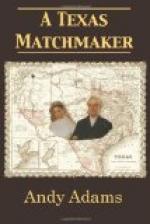I permitted no one to separate me from Esther. We started the second dance together, but no sooner did I see her sister, Mrs. Martin, whirl by us in the polka with Dan Happersett, than I suggested that we drop out and take a stroll. She consented, and we were soon out of sight, wandering in a labyrinth of lover’s lanes which abounded throughout this live-oak grove. On reaching the outskirts of the picnic grounds, we came to an extensive opening in which our saddle horses were picketed. At a glance Esther recognized Wolf, the horse I had ridden the Christmas before when passing their ranch. Being a favorite saddle horse of the old ranchero, he was reserved for special occasions, and Uncle Lance had ridden him down to Shepherd’s on this holiday. Like a bird freed from a cage, the ranch girl took to the horses and insisted on a little ride. Since her proposal alone prevented my making a similar suggestion, I allowed myself to be won over, but came near getting caught in protesting. “But you told me at the ranch that Wolf was one of ten in your Las Palomas mount,” she poutingly protested.
“He is,” I insisted, “but I have loaned him to Uncle Lance for the day.”
“Throw the saddle on him then—I’ll tell Mr. Lovelace when we return that I borrowed his horse when he wasn’t looking.”
Had she killed the horse, I felt sure that the apology would have been accepted; so, throwing saddles on the black and my own mount, we were soon scampering down the river. The inconvenience of a man’s saddle, or the total absence of any, was a negligible incident to this daughter of the plains. A mile down the river, we halted and watered the horses. Then, crossing the stream, we spent about an hour circling slowly about on the surrounding uplands, never being over a mile from the picnic grounds. It was late for the first flora of the season, but there was still an abundance of blue bonnets. Dismounting, we gathered and wove wreaths for our horses’ necks, and wandered picking the Mexican strawberries which grew plentifully on every hand.
But this was all preliminary to the main question. When it came up for discussion, this one of Quirk’s boys made the talk of his life in behalf of Thomas Moore. Nor was it in vain. When Esther apologized for the rudeness her mother had shown me at her home, that afforded me the opening for which I was longing. We were sitting on a grassy hummock, weaving garlands, when I replied to the apology by declaring my intention of marrying her, with or without her mother’s consent. Unconventional as the declaration was, to my surprise she showed neither offense nor wonderment. Dropping the flowers with which we were working, she avoided my gaze, and, turning slightly from me, began watching our horses, which had strayed away some distance. But I gave her little time for meditation, and when I aroused her from her reverie, she rose, saying, “We’d better go back—they’ll miss us if we stay too long.”




